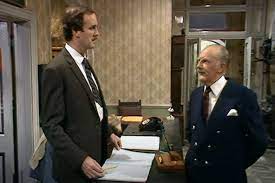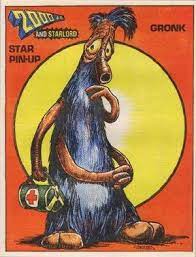
From abc.net.au / © BBC
‘Woke’… What does that word even mean?
Here’s failed US presidential candidate and failed insurrectionist Donald Trump using it to denigrate the American women’s soccer team, who do un-Trumpian things like ‘taking the knee’ during the playing of the Star-Spangled Banner. “Woke equals failure!” he barked on TruthSocial, his minor social-media platform, when the team was knocked out of this year’s Women’s Football World Cup.
And here’s John Cleese grumping about the BBC being woke because it banned that episode of Fawlty Towers (1975-79) where the Major uses some unfashionable language to describe the West Indies cricket team. (In fact, the episode was temporarily pulled from the BBC-owned streaming service UKTV, and reviewed, and reinstated with a content warning.) Cleese is so incensed by wokeness that he’s started hosting a TV chat-show in which he fulminates against it. His show is called The Dinosaur Hour (2023) and it’s broadcast on the right-wing, alleged ‘news’ channel GB News. Amusingly, Cleese was peeved to discover that his new employers at GB News had just signed Boris Johnson, whom he considers a ‘serial liar’, to host a show too. Well, John, when you lie down with dogs, expect to get up with fleas. In this case, big, blonde, bloviating, bonking Boris-fleas.
Another household name much concerned about woke behaviour is Elon Musk, who last year purchased Twitter (or X, as he calls it now) and set about purging it of wokeness. He’s certainly done that. He’s also purged the platform of half of its advertising revenue and half of the value of its acquisition price. Musk has described wokeness as a ‘mind-virus’ and ‘communism rebranded’ – and communism, he’ll tell you, is a very bad thing. Though that hasn’t stopped him opening a big Tesla plant in communist China, in Shanghai, and being warmly welcomed every time he visits the country, and declaring that democratic, capitalist Taiwan is actually Chinese property. Musk is also introducing to Twitter a ‘snarky, anti-woke AI chatbot’ called ‘Grok’, which sounds like a character from the sci-fi comic 2000 AD (1977-present).

From britishcomic.fandom.com / © Rebellion Developments
I don’t agree with Musk on much but he’s right to liken wokeness to a virus. Because the moment that people with his right-wing politics come into contact with it, they seem to turn red-eyed, froth at the mouth and gibber insanely, like the infected did in Danny Boyle’s 28 Days Later (2003).

© DNA Films / UK Film Council / Fox Searchlight Pictures
But if you need refuge from wokeness, just move to Florida. There, Governor Ron DeSantis has been pushing a ‘Stop-Woke Act’ in the hope that the state will be ‘the place where woke goes to die’. In fact, DeSantis’s Florida is now so anti-woke, and so determinedly opposed to the teaching of wokey things like Critical Race Theory, that its State Board of Education has kids learning in school that slavery was a good thing because it helped the black slaves to develop ‘skills which, in some cases, could be applied for their personal benefit‘. Wow. Who knew?
I’m sure DeSantis’s achievements in Florida are admired by Suella Braverman, the belligerent and self-serving British Conservative politician who was very recently sacked from her position as the UK’s Home Secretary. During her time in office, she slammed the British police force for being too woke. One example was when she claimed to have reprimanded officers in Essex for the woke act of raiding a pub and removing a display of racist golliwogs. (Except that she didn’t – it turned out that Suella had been disingenuous, or stupid, or both, which is perfectly possible in her case.) Suella, or ‘Sewer-ella’ as I like to think of her, also famously condemned a faction she called the ‘Guardian-reading, tofu-eating wokerati’. Supposedly, these have formed a ‘coalition of chaos’ with the opposition parties and are responsible for all of Britain’s ills. She said this whilst serving in the brief but tumultuous government of Liz Truss. Accusing someone else of being part of a coalition of chaos? That’s a bit rich, given the context.
Elsewhere, the Daily Mail has complained that woke builders are daring to ‘enjoy yoga, muesli, listening to Radio 4 and sharing their feelings’ rather than ‘devouring greasy-spoon breakfasts and discussing sport.’ Xbox games consoles have been accused of being woke for getting updated with an ‘energy saver’ mode to lessen their power consumption – because, as you know, attempting to be more environmentally-friendly just drips with contemptible wokeness. The makers of The Simpsons (1989-present) have been lambasted for being woke, coincidentally by Cleese’s associates at GB News, for no longer having scenes where Homer loses his rag at Bart, picks him up by the throat and strangles him until his eyes bulge and tongue protrudes. Not wanting to strangle children? How hideously woke.
So, what does ‘woke’ actually mean? Well, according to Wikipedia, it’s “an adjective derived from African-American Vernacular English (AAVE) meaning ‘alert to racial prejudice and discrimination’. Beginning in the 2010s, it came to encompass a broader awareness of social inequalities such as racial injustice, sexism and LGBT rights.” Fascinatingly, the phrase ‘stay woke’ goes all the way back to 1938, when it was first heard on a recording of a song called Scottsboro Boys by the legendary blues singer Huddie Ledbetter, aka, Lead Belly.

From wikipedia.org / © William P. Gottlieb Collection
Though how the term ‘woke’ became elastic enough to encompass eating tofu, and builders talking about their feelings, and Xboxes having energy-saving modes, and Homer Simpson not throttling his offspring, is anyone’s guess. Perhaps a simpler definition of the term – certainly when you look at the people mentioned above who’ve railed against it, like Trump, Musk, DeSantis, Braverman, the Daily Mail and GB News – might be: ‘Anything that right-wing tossers don’t like.’
Indeed, as somebody who considers himself partly Scottish, I felt a surge of pride a while ago when Gavin McInnes, founder of the neo-fascist American militia the Proud Boys, denounced Scotland as ‘the most woke country in the world.” No wonder Scottish novelist Christopher Brookmyre responded to McInnes’s ravings by saying: “That delighted me…”
Unfortunately, nobody ever lost money by underestimating human beings’ intelligence. There’s clearly political mileage in ranting endlessly about wokeness. Gradually, you brainwash millions of people, mainly older ones who don’t get out much, and sit and watch Rupert Murdoch’s Fox News all day, into believing that dark, malevolent woke forces do indeed lurk in the world, planning to deprive them of their Bibles, guns, gas-guzzling automobiles, Big Macs, racist jokes, un-politically-correct 1970s TV shows, etc. It’s also convenient for the likes of Trump (currently facing 91 felony counts) and Britain’s Conservative government (trying to justify why the country is such a horrible, unhappy mess when they’ve been in charge of it for the past 13 years) to peddle the narrative that the establishment is riddled with hostile woke agents. The civil service, the courts, the police… A giant woke conspiracy is being implemented from society’s corridors of power and it’s trying to discredit them and stymie their every move.
I’m not claiming, by the way, that stupidity is confined to right-wingers. The left is also capable of it. In recent years the American right has infiltrated school-boards and removed books they disapprove of from syllabuses and libraries, books deemed too woke, often written by people of colour or members of the LGBT community, and often featuring characters of colour or LGBT characters. There was even a book suspended in Alabama because officials didn’t like the sound of the author’s name, Marie-Louise Gay. But left-wing educators have done themselves no favours by trying to ban books that offend their sensibilities too.
For example, I lately came across the case of a school board in Washington State pulling Harper Lee’s To Kill a Mockingbird (1960) off its required reading list for ninth-graders because a group of ‘progressive’ teachers objected to it. Sure, you can argue that To Kill a Mockingbird portrays its black characters with less depth than its white characters and has a ‘white saviour’ narrative that’s offensive to many. But shouldn’t teachers focus on developing their students’ powers of critical thinking, argument and self-expression so that they can articulate why they object to the book? Engaging with – certainly, studying – literature shouldn’t be limited to books you’re personally comfortable with. You should have to experience ones you find discomforting too, whilst developing the ability to formulate logical and coherent responses to them.
I don’t deny there are works that some people will find upsetting because of their beliefs or backgrounds or difficult experiences they’ve had in their lives. And I don’t see anything wrong with books and stories having trigger warnings, which inform readers the content they’re about to immerse themselves in may be uncomfortable or even traumatising. I say that as a writer who’s had trigger warnings attached to his fiction in the past. But banning books altogether? I don’t agree with censorship, unless it’s of something that’s completely off-the-scale in promulgating odious stereotypes and stirring up hatred.
Otherwise, I don’t have much of a problem with wokeness. Especially as it seems to annoy all the right – and I mean ‘right’ – people. So, now, it’s time to sign off and grab some lunch. What will I have…? Why, tofu of course. Up yours, Sewer-ella.

From wikipedia.org / © UK Government Web Archive




